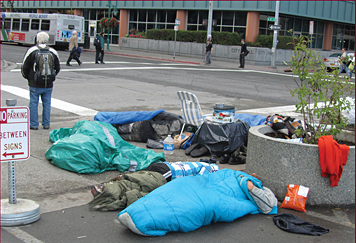MAYOR SULLIVAN VETOES ASSEMBLY ORDINANCE 2012-88
Lindsey Whitt
Communications Director
Office of the Mayor
whittla@muni.org
Direct: [907] 343-7103
Cell: [907] 433-9543
Pursuant to the authority vested in me by Charter section 5.02(c), I hereby veto AO 2012-88, which seeks to repeal the safe sidewalk code.
My goal in introducing the original code was to ensure pedestrians can safely move about our vibrant downtown and not have to navigate sidewalks occupied by large cardboard boxes, personal belongings, mounds of trash, and people sleeping. My goal is not, and has never been, to impede the right of free speech.

People may exercise their right to free speech in many ways, including “sit-ins” in the parks and on sidewalks outside of downtown, and participate in marches, parades, and protests in and along our roads and sidewalks. If they get a permit so there is a safety plan in place, they can even take over and sit or lay down on downtown sidewalks.
The code is a very narrowly tailored law aimed at conduct, not speech. As the 9th Circuit Court of Appeals so eloquently said in its decision upholding Seattle’s model law back in 1996:
The first step to wisdom is calling a thing by its right name. Whoever named “parkways” and “driveways” never got to step two; whoever named “sidewalks” did.
Seeing the wisdom of preserving the sidewalk as an area for walking along the side of the road, the City of Seattle passed an ordinance generally prohibiting people from sitting or lying on public sidewalks in certain commercial areas between seven in the morning and nine in the evening. The ordinance doesn't restrict sitting or lying in public parks, private or public plazas, or alleys, nor sitting on the sidewalk in noncommercial areas of the city. It also permits sitting on the sidewalks in the commercial areas at night. No one may be cited, moreover, unless first notified by a police officer that he's sitting or lying where he shouldn't.
By its terms, it prohibits only sitting or lying on the sidewalk, neither of which is integral to, or commonly associated with, expression. Subject to other valid legislation, homeless people remain free to beg on Seattle's sidewalks, passively or not. Voter registrars may solicit applications for the franchise. Members of the Freedom Socialist Party may doggedly pursue petition signatures and donations, or distribute educational materials. And the National Organization for Women may hold rallies or demonstrations.
Many other cities have these laws. The citizens of San Francisco became so frustrated with their own situation that they passed a similar law by initiative in 2010. The City of Berkeley has the law up for voter approval on its November 2012 ballot. If these bastions of individual freedoms see a clear need to make public spaces truly public, it is obvious that a few were obstructing the many, and the many have now rightfully said no one should co-opt public spaces for their unlimited, unending individual purposes. Anchorage is not alone in seeing a need to make public spaces serve their intended purpose. For Anchorage’s downtown sidewalks, this means a safe, efficient place to walk during peak hours.
Some say this code is an attack on the homeless. It is not. I challenge people to look at my record. I have made a huge commitment to providing services for homeless people, while protecting our public spaces for the benefit of all our residents. Deaths of homeless people have dropped dramatically under my administration and resources available to them have climbed. I will continue to seek funding and try new initiatives to help our homeless population.
For these reasons, the Assembly majority’s concern with this code is misplaced and AO 2012-88 is vetoed.
###